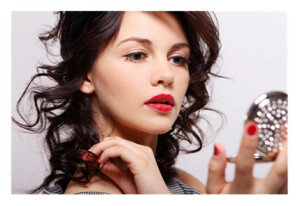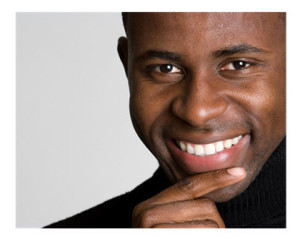Primping before meeting someone for the first time, I take longer in front of the mirror. I fuss over lipstick and liner. Is this vanity? If so, is it a problem?
 Sitting at a stoplight in traffic as I head to an appointment, I touch up my mascara and check my hair. Is this vanity? Again, where is the harm?
Sitting at a stoplight in traffic as I head to an appointment, I touch up my mascara and check my hair. Is this vanity? Again, where is the harm?
If I exaggerate my accomplishments, if I interrupt you at every turn, if I will not entertain your recommendations, if I do not perceive how my behavior makes you feel – is this excessive confidence in my skills or indications of narcissism?
If you browse my smartphone and find that 50% of my images are selfies, would you deem me vain? Would you call me a narcissist?
Vanity vs. Narcissism: Clarifications
Years ago I knew a woman I considered a great beauty. At moments, I also considered her vain. I made that judgment based on the amount of time she obsessed over her hair, her cosmetics, or just the right outfit for an occasion. To me, she could never look “bad” and her self-involvement seemed excessive.
Naturally, there such a thing as “healthy vanity” – if we consider it respect and pride for our appearance.
Yet we toss around the word “narcissism” these days as though every other person is a walking poster child for a personality disorder. Vanity, pride, ego, narcissism – these terms are not interchangeable.
What is vanity – exactly?
Merriam Webster defines vanity this way:
… inflated pride in oneself or one’s appearance; conceit
The word derives from Latin, meaning the quality of being empty. And if there was any doubt, it is not a compliment! Synonyms for vanity include: complacency, conceitedness, pomposity, pompousness, pridefulness, self-admiration, self-importance, smugness and more.
Inflated pride suggests that there is pride, and likely an attentiveness to appearance or other attributes as the source of that somewhat overarching self-approval. Pride is positive; vanity as excessive pride – a judgment call – not so much. But nor would I ever say that somewhat who is vain is “empty.”
Narcissism: A Definition
Just because one is vain, she is not necessarily narcissistic. Conversely, a narcissist is not necessarily vain.
While vanity and narcissism may share synonyms when you look in a dictionary (self-love, self-admiration), narcissism is a whole other ballgame. It typically involves some of the following: overestimation of one’s talents, a need to be the center of attention, blatant disregard for others and emotional manipulation.
I bet many of us could describe an ex-spouse, an ex-lover, or an ex-boss in these ways. Are they all narcissists, or are we simply living in an increasingly self-involved society?
I would say – the latter. And that doesn’t make us all narcissists! It does, however, offer plenty of opportunities for bad behavior. Moreover, our descriptions of those “exes” in my example are a matter of our experience and perceptions.
So what is narcissism, specifically?
Psych Central offers these symptoms, reminding us that diagnosis requires that five or more be present, and that the individual be over 18 years of age.
- Overblown sense of self (exaggerates accomplishments, expects to be seen as superior)
- Preoccupied with fantasies of power, brilliance, perfect love, unrealistic success
- Believes himself to be unique
- Demands attention and admiration (excessively)
- Takes advantage of others
- Lacks empathy
- Discounts opinions of others, is arrogant, haughty
Does Narcissism Drive Selfie Culture?
Those selfies on my smartphone or my social media pages?
In fact, there are almost none. For one thing, my arms are short! For another, it simply isn’t my cup of tea. And while some may say I’m vain (at times), this latest and most pervasive incarnation of vanity is as multifaceted a phenomenon as yours truly taking care of a touch-up, or fretting over the fit of my favorite jeans.
We worry about appearance because we are judged based on appearance. How others see us is important. And so we place our faces in image frames in an attempt to see what others may.
We also tap and snap our selfies to leave something of ourselves behind. How is this different from the old-school “tourist” photo? Didn’t we once hand our cumbersome Canons to a passerby, then pose in front of a castle or a canal?
 And yet… the selfie culture is something more – to my mind, not only a sign of self-absorption, albeit frequently benign, but a convenient bridge to friends and family who are geographically distant, a kind of communication shorthand, a pathway to acceptance, and a stalwart defense against feeling as though we are otherwise invisible.
And yet… the selfie culture is something more – to my mind, not only a sign of self-absorption, albeit frequently benign, but a convenient bridge to friends and family who are geographically distant, a kind of communication shorthand, a pathway to acceptance, and a stalwart defense against feeling as though we are otherwise invisible.
The Narcissist Label Doesn’t Always Fit
Sure, we can toss around the word narcissism – we do it all the time – but narcissism is an extreme and destructive aspect of personality, or a personality disorder. Vanity is an overdose of pride. And let’s not forget, we aspire to be confident. In fact, we laud the confident personality, just as we proclaim the value of “fake it until we make it.”
The line between confidence and arrogance is another judgment call. And again, the narcissist label does not fit.
I remember a handsome, sexy, successful man I dated a few years ago. He bordered on cocky, but he had the goods to back it up. He was no more vain than I, and the characteristics of the narcissist really didn’t apply. He was self-assured and occasionally self-important. He was not a narcissist.
As for contemporary culture and these concepts, I look not only to selfies but personal branding. How much of this is economic necessity? How much is the increasingly unquestioned culture of “self” in an attempt to beat back time, to dull insecurities, or simply to fit in?
Do I think this is the case for everyone who snaps a selfie and sends it along the digital highway?
Hardly.
Yet I worry that we are so busy “documenting” our lives that we are less inclined to live them fully. And we all seem more vulnerable than we once were – more insecure, more hurried, more rootless, and hungrier to belong – somewhere – if only briefly, courtesy of a selfie-snapping society where image is shorthand and acceptance is just a tap away.
You May Also Enjoy
Did you know there is such a thing as Selfie Sticks? Promaster Selfie Stick, Camera/Smart Phone Boom Arm, Blue
Oh yeah. There’s your fix for short arms?
I was aghast when my sister recently informed me. But it kind of defeats the whole purpose and look of those crowded, misshapen selfie shots, doesn’t it?
A boom arm?!? Now I’ve heard eveything, Barbara…
I heard that there are 2 new TV shows on this theme and one is called “Selfie.” I generally don’t watch TV so I will be watching ratings and reviews. It should be a good chuckle.
Let us know what you think, Curtis. I’ve heard of “Selfie.” I’m shaking my head… Then again, I thought “People’s Couch” was the dumbest thing I’d heard of, but then I watched. A reality show with people reacting to television shows including reality shows… (Talk about navel gazing.) But – it was really funny! Selfie? Like I said, let us know!
I think there is a thesis in there somewhere.
I like this opinionated article. Great insight, true words… especially the last few sentences. Sometimes we are too busy trying to take a picture of a moment that we forget to live in that moment, so it diminishes the purpose and potential of the moment to something much less than it could’ve been.
Inflated pride in the definition of vanity has nothing to do with attentivness, man or women can be attentive HOW MUCH THEY WANT about their appearance or their achievements. It’s none of anyone’s business!!!! Inflated pride just means conceit, too much pride in something you did or have meaning you think you’re better then others, being boastful!
Someone can not even be attentive of something (being born into a rich family) and still have inflated pride!